A look to the past HEPEX workshop
by Ilias Pechlivanidis (SMHI)
The HEPEX 2023 workshop left many of us with bittersweet feelings; bitter cause we had to say “goodbye” to many great HEPEXers that travelled from around the world to Norrköping, and sweet cause the workshop was a great success with very interesting contributions and discussions that made both the scientists and practitioners to set new state-of-the-art in hydrological forecasting for decision-making.
HEPEX workshop 2023 – Group photo
More than 60 onsite participants (and about 45 online) from more than 20 countries gathered in the small city of Norrköping, Sweden to elaborate on a set of hydrological forecasting-related topics, including integration of sectoral needs and AI techniques across spatial scales and time horizons. Participants showcased their work in enhancing forecasts through post-processing, data assimilation, evaluation from a user-perspective, while highlighted the developments in impact-based forecasting and warning systems. Throughout the workshop, discussions around priorities and unresolved challenges in hydrological forecasting were discussed. The workshop created a space for advanced research and practical solutions to communicate, while various ideas were exchanged on the essential science and actions needed to advance the field.
Below you are able to download all presentations and posters, and see some of the nice photos taken during the event.
On behalf of all HEPEX/EC-HEPEX co-chairs, special thanks go to Energiforsk for sponsoring the event, the organising and scientific committee, and all presenters and participants!!
In 2024 our HEPEX community celebrates its 20 years. Stay tuned for exciting surprises!
Agenda (including the PDFs of the presentations)
| Day 1: 13th September 2023 (Wednesday) | ||
| 13.00 – 13.30 | Registration | |
| 13.30 – 13.40 | Welcoming note from SMHI | Ilias Pechlivanidis |
| 13.40 – 13.50 | Presentation of HEPEX / EC-HEPEX and workshop aims – PDF | Marie-Amélie Boucher |
| Session 1: Forecasting at different time scales addressing sectoral needsChair: James Bennett | ||
| 13.50 – 14.20 | Keynote talk #1Energiforsk – Coordinating the hydropower industry’s hydrological research needs – PDF | Emma Hagner |
| 14.20 – 14.30 | Trends and uncertainty in long inflow predictions for hydropower management – PDF | David Horsley |
| 14.30 – 14.40 | A continental US testbed for basin-scale S2S climate predictions supporting water management – PDF | Andy Wood |
| 14.40 – 14.50 | Evaluation of continental-scale ensemble hydrological forecasts from environment and climate change Canada: A comparison with forecasts from the global flood awareness system (GloFAS) (Online) – PDF | Étienne Gaborit |
| 14.50 – 15.00 | Open Discussion | James Bennett |
| 15.00 – 15.30 | Presentation of posters (90 seconds each) | See list of posters |
| 15.30 – 16.10 | Coffee break / Poster display / Group photo | |
| Session 2: AI-enhanced hydrological forecasting across time horizonsChair: Ilias Pechlivanidis | ||
| 16.10 – 16.20 | Enhancing tropical cyclone rainfall forecasts for anticipatory humanitarian action using machine learning – PDF | Andrea Ficchì |
| 16.20 – 16.30 | A reproducible data-driven workflow for probabilistic seasonal streamflow forecasting over North America (Online) – PDF | Louise Arnal |
| 16.30 – 16.40 | Enhancing seasonal hydrological forecasting via local data integration and machine learning – PDF | Yiheng Du |
| 16.40 – 16.50 | Open Discussion | Ilias Pechlivanidis |
| 16.50 – 17.00 | A hybrid multi-basin ML flood model driven with seasonal climate forecasts from C3S – PDF | Simon Moulds |
| 17.00 – 17.10 | Improving the performance of hydrological model forecast using a time-varying multivariate ENKF assimilation – PDF | Visweshwaran Ramesh |
| 17.10 – 17.20 | The role of earth observations and in situ data assimilation in seasonal hydrological forecasting – PDF | Jude L. Musuuza |
| 17.20 – 17.30 | Open Discussion | Ilias Pechlivanidis |
| 17.30 – 19.00 | Free timeOptional: Visit to SMHI (Group 1) – 20’ / Frisbee – 60’ / Table tennis – 60’ | |
| 19.00 – 22.00 | Dinner | |
| Day 2: 14th September 2023 (Thursday) | ||
| Session 3: Meteorological advancements driving hydrological forecasts at different time scalesChair: Fredrik Wetterhall | ||
| 09.00 – 09.10 | Challenges of operational weather forecast verification(Online) – PDF | Thomas C. Pagano |
| 09.10 – 09.20 | Enhancing NMME precipitation forecast accuracy using SM2RAIN-Climate: A case study over Europe – PDF | Hamidreza Mosaffa |
| 09.20 – 09.30 | Spatial mode-based calibration (SMOC) of forecast precipitation fields from NWP models (Online) – PDF | Pengcheng Zhao |
| 09.30 – 09.40 | Allowing human expertise on meteorological ensemble forecasts (Online) – PDF | Théo Mesure |
| 09.40 – 09.50 | Open Discussion | Fredrik Wetterhall |
| 09.50 – 10.00 | Short term drought prediction based on stable states between the land and the atmosphere – PDF | Joshua K. Roundy |
| 10.00 – 10.10 | An evaluation of subseasonal hydrometeorological ensemble forecasts at different time scales (Online) – PDF | Wentao Li |
| 10.10 – 10.20 | Enhancing sub-seasonal hydrological drought predictions in the European Alpine space using EFAS forecasts – PDF | Annie Y.-Y. Chang |
| 10.20 – 10.30 | Open Discussion | Fredrik Wetterhall |
| 10.30 – 11.00 | Coffee break / Poster display | |
| Session 4: Recent advances in impact-based forecasting and system evaluationsChair: Louise Slater | ||
| 11.00 – 11.30 | Keynote talk #2Forecasting socio-hydrological extremes – PDF | Giuliano Di Baldassarre |
| 11.30 – 11.40 | Impact-based flood warnings in Sweden using a flood inundation map library approach – PDF | Nina Bosshard |
| 11.40 – 11.50 | Long range impact-based forecasts for agricultural drought early warning in Australia – PDF | Andrew Schepen |
| 11.50 – 12.00 | Advances and gaps in the science and practice of impact-based forecasting of droughts – PDF | Anastasiya Shyrokaya |
| 12.00 – 12.10 | Mediterranean and pan-European forecast and early warning systems against natural hazards: A contribution to the early warnings for all (EW4ALL) initiative – PDF | Jürg Luterbacher |
| 12.10 – 12.20 | Open Discussion | Louise Slater |
| 12.20 – 12.30 | A user centered design approach to co-develop a decision support systems for impact-based flood warnings to improve local flood preparedness – PDF | Trine J Hegdahl |
| 12.30 – 12.40 | Evaluation of a real-time regional ensemble flow forecasting system in Catalonia of a 2-year term – PDF | Xinyu Li |
| 12.40 – 12.50 | A skill analysis of the European flood awareness system (Online) – PDF | Jesus Casado Rodriguez |
| 12.50 – 13.00 | Open Discussion | Louise Slater |
| 13.00 – 14.00 | Lunch | |
| 14.00 – 15.30 | Breakout group discussions (4 groups)Which are HEPEX’s top 5 priorities for (co-)creating forecast systems that add value across spatial scales and time horizons? | |
| 15.30 – 16.00 | Coffee break / Poster display | |
| Session 5: Novelties in modelling, predicting and communicating extreme flood eventsChair: Andy Wood | ||
| 16.00 – 16.30 | Reporting back from the breakout group discussions | |
| 16.30 – 16.40 | The Iowa flood center real-time streamflow forecasting system – PDF | Felipe Quintero |
| 16.40 – 16.50 | SONICS: a novel in-house development system for detection and forecasting potential river floods in Peru (Online) – PDF | Harold Llauca |
| 16.50 – 17.00 | Regional scale forecasting for surface water floods – PDF | Linda Speight |
| 17.00 – 17.10 | FLOODGAN 2.0: Dynamic pluvial flood forecasting using deep learning (Online) – PDF | Julian Hofmann |
| 17.10 – 17.20 | Communicating probabilistic flood forecasts maps to different user groups – PDF | Marie-Amélie Boucher |
| 17.20 – 17.30 | Open Discussion | Andy Wood |
| 17.30 – 18.00 | Keynote talk #3The rise of machine learning in forecasting – HEPEXAI? – PDF | Florian Pappenberger |
| 18.00 – 19.00 | Free time | |
| 19.00 – 22.00 | Dinner | |
| Day 3: 15th September 2023 (Friday) | ||
| Session 6: Enhancing early warnings and hydro-climate servicesChair: Maria-Helena Ramos | ||
| 09.00 – 09.10 | Trended climatology for seasonal streamflow forecasts (Online) – PDF | Tristan D. J. Graham |
| 09.10 – 09.20 | Testing a Bayesian joint probability modelling approach to bias correct sub-seasonal and seasonal forecasts for drought risk management in Spain – PDF | Celia Ramos Sánchez |
| 09.20 – 09.30 | Efficient and precise flood inundation predictions using the LSG model (Online) – PDF | Niels Fraehr |
| 09.30 – 09.40 | Open Discussion | Maria-Helena Ramos |
| 09.40 – 09.50 | A brief history of co-creating and the integration of local knowledges, data and needs in climate services – PDF | Micha Werner |
| 09.50 – 10.00 | Advancing drinking water management with hydro-climate services: the co-generation success story of SMHI Aqua – PDF | Carolina Cantone |
| 10.00 – 10.10 | Delivering better forecasts: co-developing hydrological status and outlooks systems for increased water security – PDF | Katie Facer-Childs |
| 10.10 – 10.20 | Jointly verifying and evaluating seasonal forecasts from climate services: experience from the H2020 CLARA project – PDF | Louise Crochemore |
| 10.20 – 10.30 | Open Discussion | Maria-Helena Ramos |
| 10.30 – 11.00 | Coffee break / Poster display | |
| 11.00 – 11.30 | Keynote talk #4Progress and perspectives in hydrometeorological modelling and forecasting – PDF | Antara Dasgupta |
| 11.30 – 12.30 | Navigating Future Water Challenges: An early-career panel discussion | Early Career (EC-)HEPEX |
| 12.30 – 12.45 | Closing – Wrapping up | Ilias Pechlivanidis |
| 12.45 – 14.00 | Lunch / Visit to SMHI (Group 2) | |
| End of workshop | ||
List of Posters
| # | Title | First author |
| 1 | Developing the post-processing of the European flood awareness system’s forecasts – PDF | Gwyneth Matthews |
| 2 | Evaluation of multi-basin hydrological models in terms of quantile extremes – PDF | Yiheng Du |
| 3 | Connections between electricity production and climate variability in Europe: A spatial and temporal analysis – PDF | Dong An |
| 4 | Improving GloFAS rapid inundation mapping products through satellite data assimilation – PDF | Antara Dasgupta |
| 5 | Making better forecasts: Developing and applying advances in statistical streamflow forecasting techniques across scales – PDF | Katie Facer-Childs |
| 6 | Sub-seasonal forecasting of shallow groundwater levels in Switzerland – PDF | Raoul Collenteur |
| 7 | Availability of solar, wind and hydropower across Europe – PDF | Anders Wörman |
| 8 | Hydro Tasmania’s short- to long-range ensemble inflows prediction (SLEIP) system – PDF | James C. Bennett |
| 9 | Basis for a flood warning system in a fast-flow mediterranean catchment – PDF | Rafael Pimentel |
| 10 | The hydropower industry’s hydrological development programme – HUVA – PDF | Emma Hagner |
| 11 | Continuous verification to improve forecasters forecasting skill – PDF | Maarten Smoorenburg |
Selected photos
Former and current HEPEX co-chairs: Andy Wood (NCAR, US), Florian Pappenberger (ECMWF, UK), Maria-Helena Ramos (INRAE, France), Fredrik Wetterhall (ECMWF, UK), Ilias Pechlivanidis (SMHI, Sweden), Marie-Amélie Boucher (Uni. of Usherbrooke, Canada) and James Bennett (CSIRO, Australia)
Early career panel discussion (from left to right: Louise Crochemore, Yiheng Du, Annie Y.-Y. Chang, Andrea Ficchí, Beatriz Quesada Montano, and Simon Moulds)
Thanking Andy Wood (NCAR) for his contribution to HEPEX
Breakout discussion (group 1) on the priorities for (co-)creating forecast systems that add value across spatial scales and time horizons
Breakout discussion (group 2) on the priorities for (co-)creating forecast systems that add value across spatial scales and time horizons
Giuliano Di Baldassarre keynote presentation on forecasting socio-hydrological extremes
Florian Pappenberger keynote presentation on the rise of machine-learning in forecasting
Antara Dasgupta keynote presentation highlighting the progress and perspectives in hydrometeorological modelling and forecasting
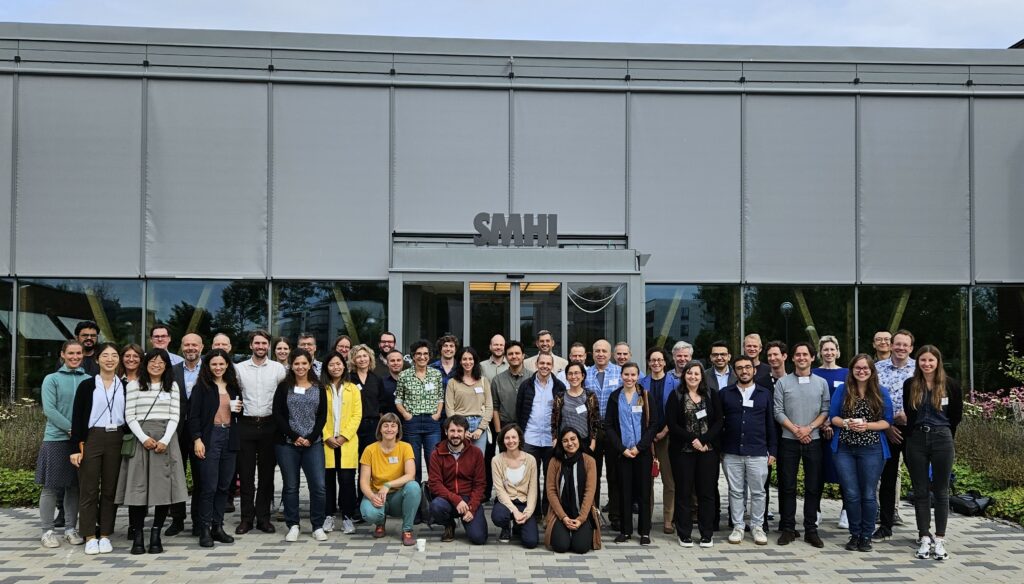
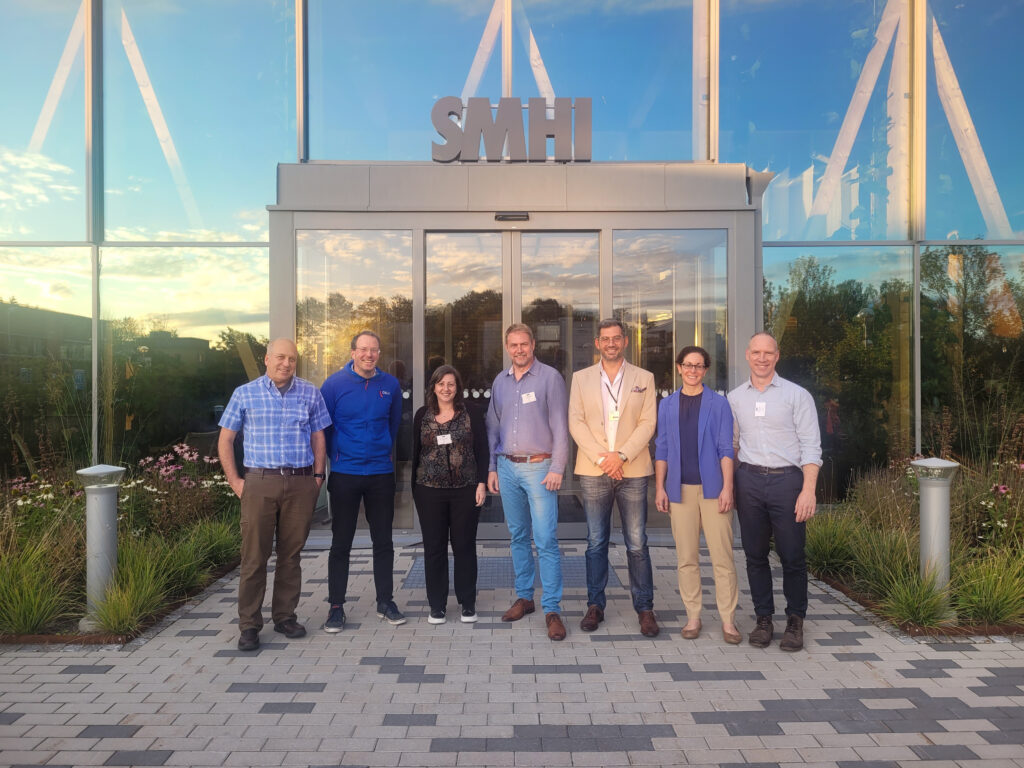
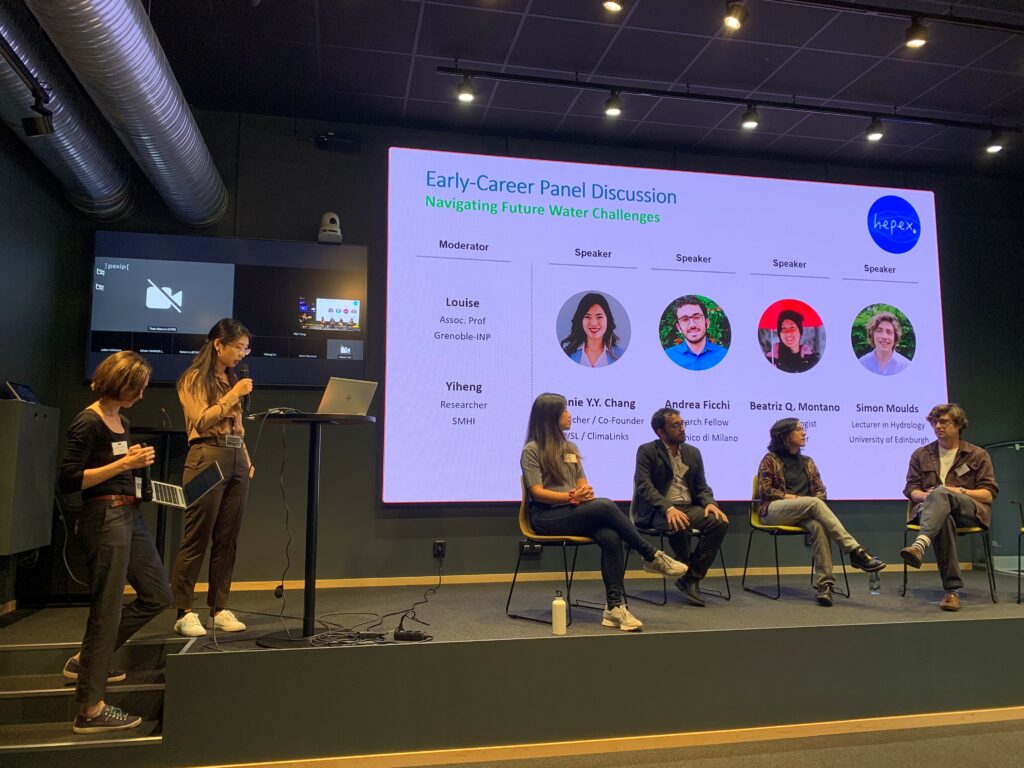
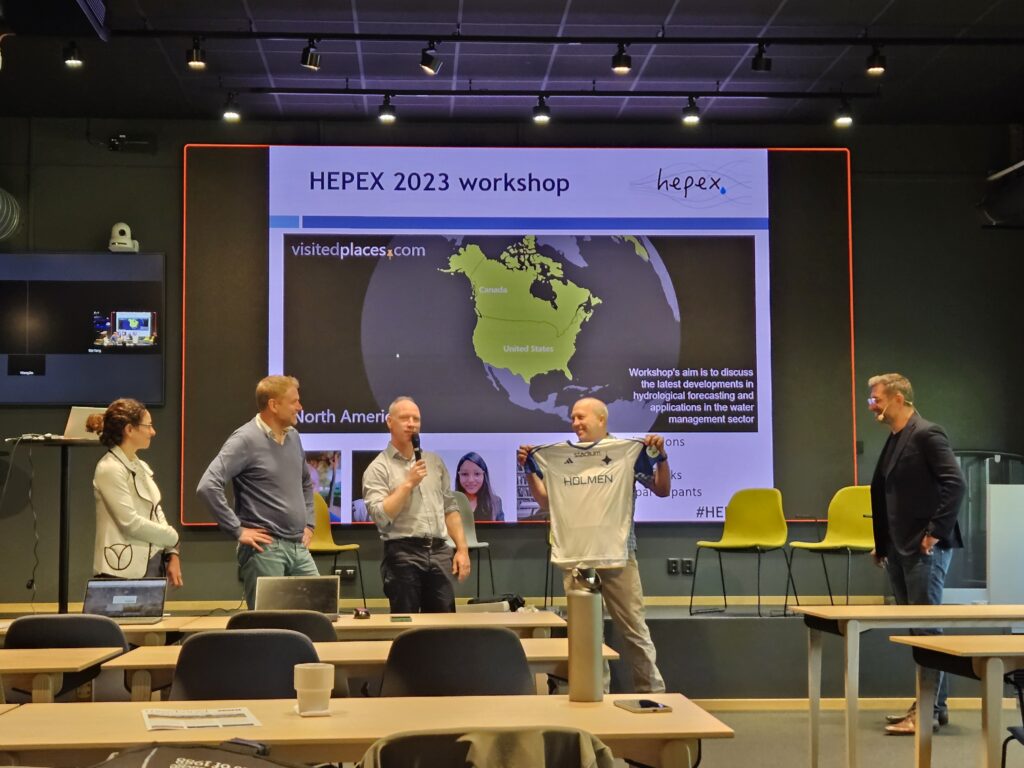
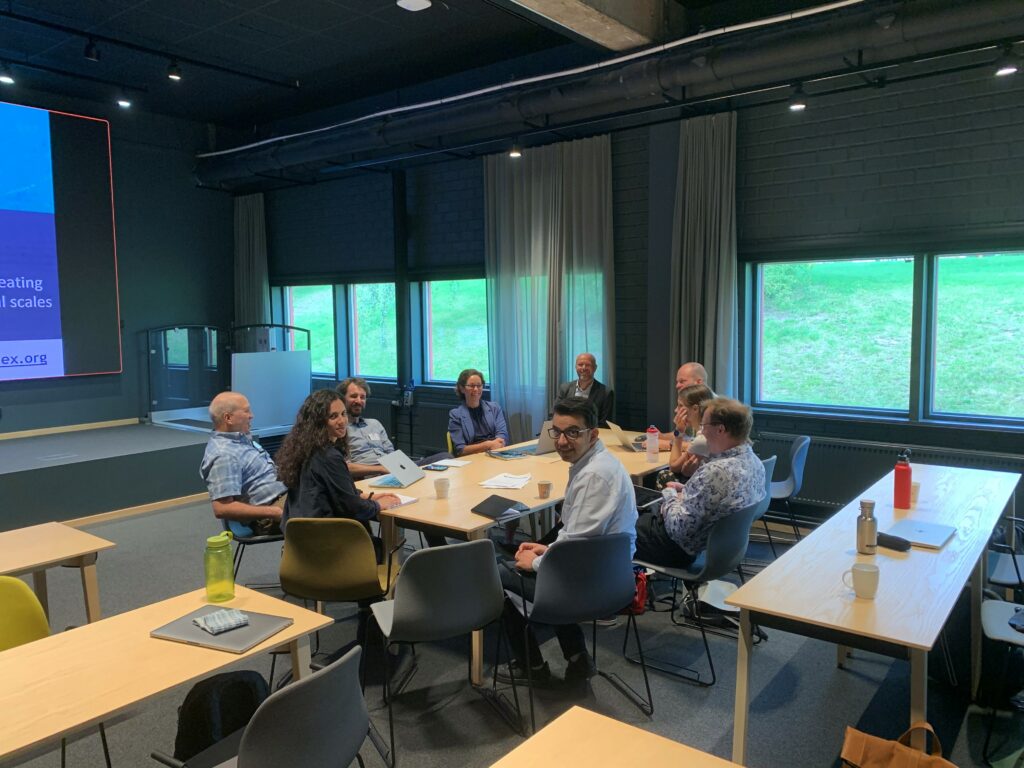
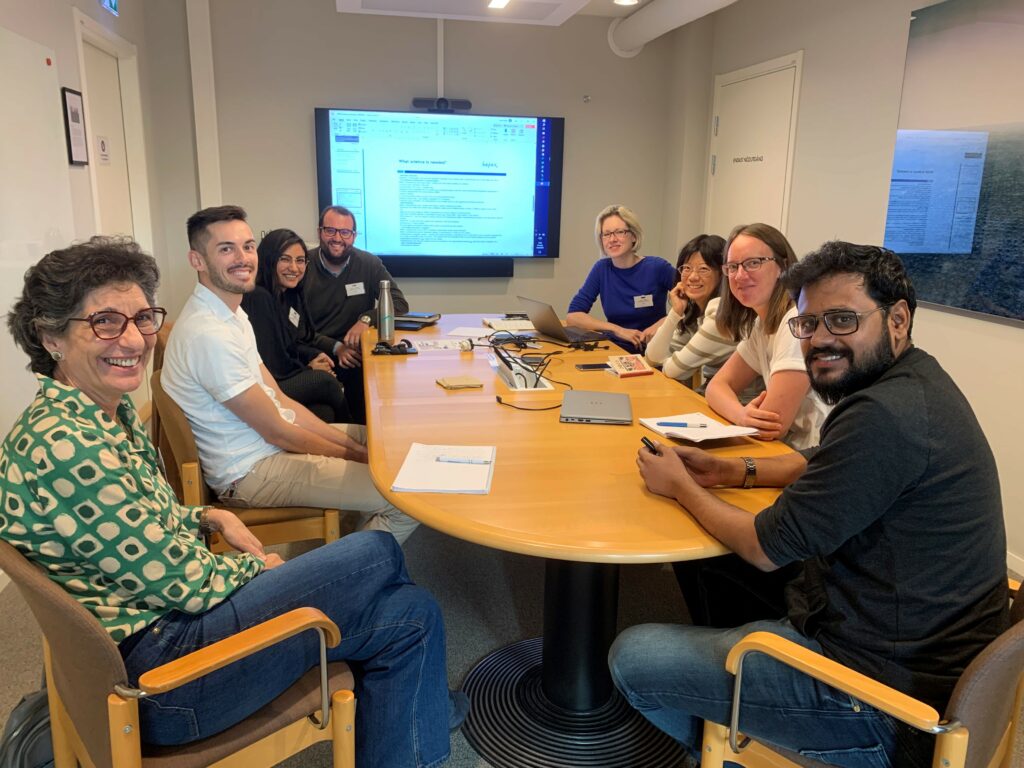
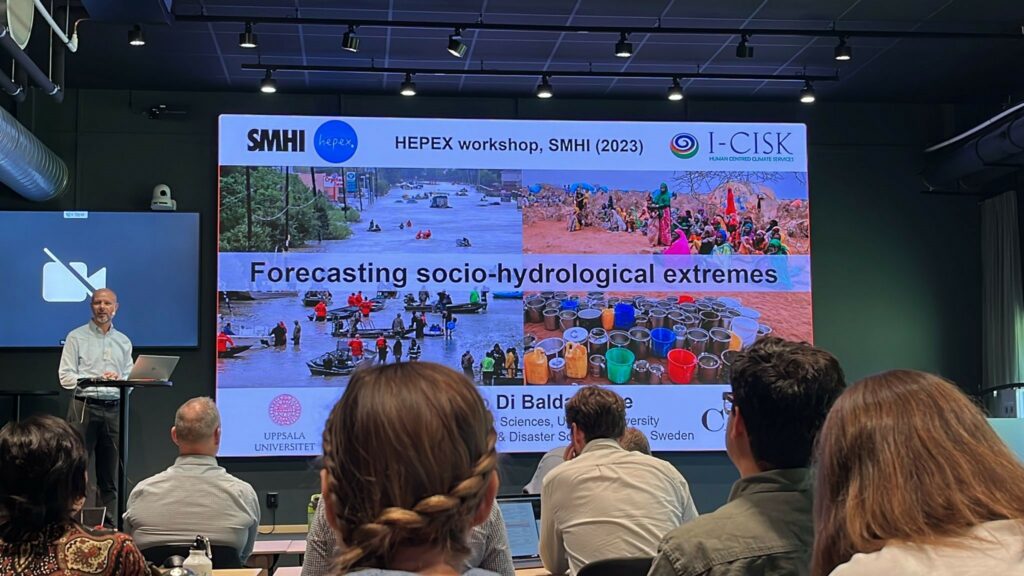
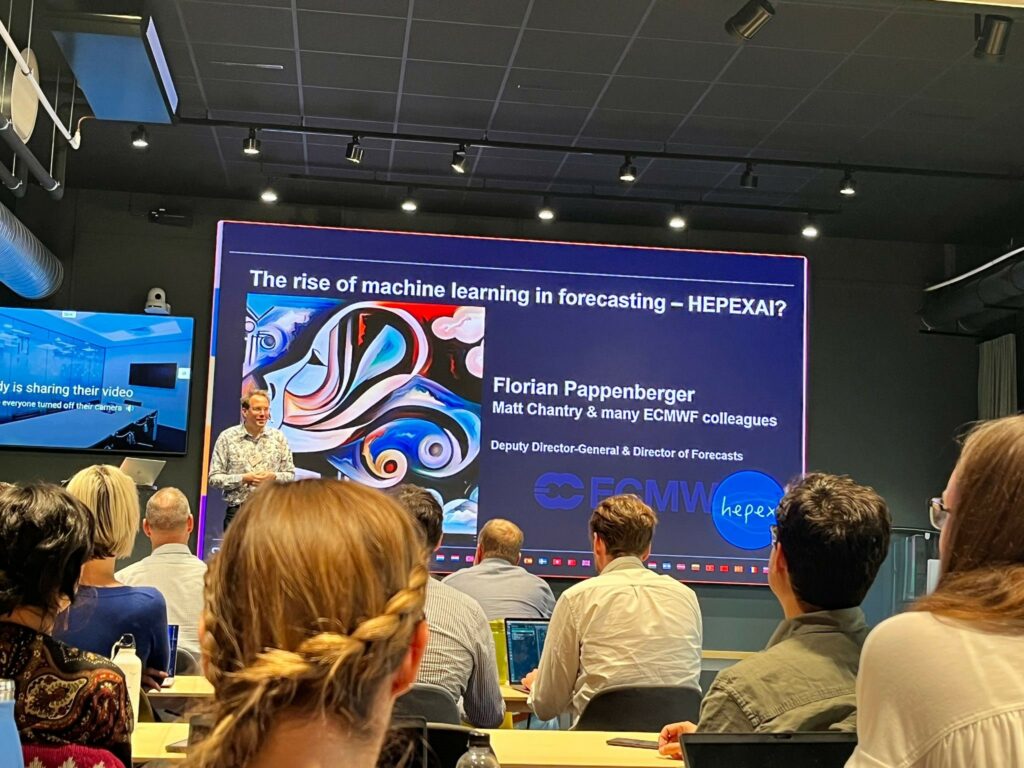
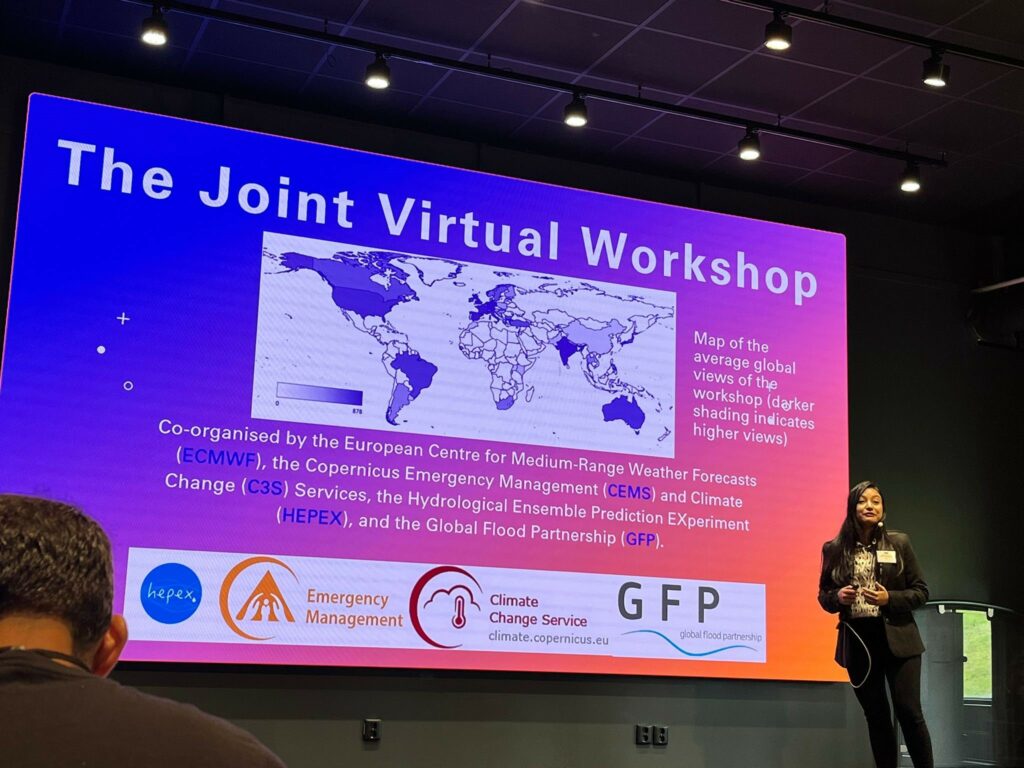
0 comments